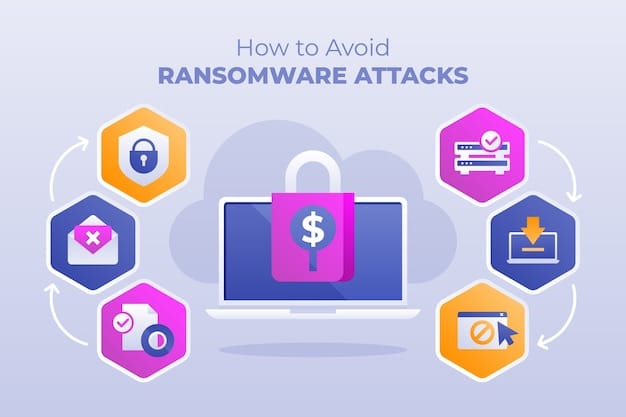Digital Coupon Security: 3 Steps to Avoid Scams & Protect Your Data

Digital coupon security is crucial for savvy shoppers; learn how to identify scams and safeguard your personal data with our 3-step guide, ensuring a safe and rewarding couponing experience.
Navigating the world of digital coupons can unlock fantastic savings, but it’s essential to prioritize digital coupon security. With the rise of online fraud, savvy couponers need to be vigilant about protecting their personal data and avoiding potential scams.
Understanding the Risks of Digital Coupon Scams
Digital coupons offer incredible opportunities to save money, but they also present risks. Understanding the common types of scams and the potential consequences is the first step in staying safe. It’s no longer sufficient to just find a deal; you need to understand how to protect your information while doing it.
Common Types of Digital Coupon Scams
Scammers are constantly developing new techniques to trick unsuspecting users. Here are some of the most common types of digital coupon scams to watch out for:
- Phishing Scams: These involve fraudulent emails or messages that appear to be from legitimate companies, asking for personal information or directing you to fake websites.
- Fake Coupon Websites: These websites mimic legitimate coupon sites but are designed to steal your information or install malware on your device.
- Social Media Scams: Scammers often use social media platforms to distribute fake coupons or run fraudulent contests.
- Coupon Code Generators: Websites or apps that claim to generate working coupon codes are often scams designed to trick you into downloading malware or providing personal information.
Potential Consequences of Falling for a Scam
The consequences of falling for a digital coupon scam can be severe. These can include:
- Identity Theft: Scammers can use your personal information to open fraudulent accounts, make unauthorized purchases, or commit other crimes.
- Financial Loss: You could end up losing money by paying for fake coupons or products, or by having your financial accounts compromised.
- Malware Infections: Clicking on malicious links or downloading infected files can lead to malware infections that can damage your device and steal your data.
Ultimately, recognizing the potential risks is paramount in ensuring digital coupon security. Stay informed about the latest scam tactics and always exercise caution when engaging with online coupon offers.
Step 1: Verify the Source of the Coupon
One of the most important steps in ensuring digital coupon security is to verify the source of the coupon. Legitimate companies and retailers typically distribute coupons through their official websites, email newsletters, or trusted coupon platforms. Here’s how to confirm the source:

Check the Website’s URL
Always examine the website’s URL carefully. Look for any misspellings, unusual characters, or domain extensions that don’t match the legitimate website. Secure websites use “https” in the URL and have a padlock icon in the address bar.
Confirm the Sender’s Email Address
If you receive a coupon via email, verify the sender’s email address. Legitimate companies usually use email addresses that match their official website domain. Be wary of emails from generic addresses or those with unusual domain names.
Use Official Coupon Websites and Apps
Stick to well-known and trusted coupon websites and apps. These platforms typically have security measures in place to verify the authenticity of coupons and protect your data. Some popular options include:
- RetailMeNot: A leading coupon website that offers a wide range of discounts and promo codes.
- Coupons.com: A trusted source for printable and digital coupons from major brands.
- Honey: A browser extension that automatically finds and applies the best coupon codes when you shop online.
Verifying the source of the coupon is a crucial step in upholding digital coupon security. By carefully checking URLs, email addresses, and sticking to known coupon resources, you can significantly lower the danger of experiencing scams.
Step 2: Protect Your Personal Information
Protecting your personal information is essential when using digital coupons. Scammers often try to trick you into providing sensitive data, such as your name, address, phone number, or financial information. Here are some tips to keep your information safe:
Be Cautious of Requests for Personal Information
Never provide personal information unless you are absolutely sure that the request is legitimate. Be especially wary of coupons that require you to fill out lengthy surveys or provide detailed personal information. A real coupon should typically need minimal information to redeem.
Use Strong and Unique Passwords
Create strong and unique passwords for all of your online accounts, including coupon websites and apps. Use a combination of uppercase and lowercase letters, numbers, and special characters. Avoid using the same password for multiple accounts.
Enable Two-Factor Authentication
If available, enable two-factor authentication (2FA) for your online accounts. 2FA adds an extra layer of security by requiring you to provide a second verification code in addition to your password.
- Navigate to the security settings of your accounts.
- Find the option for two-factor authentication.
- Follow on-screen prompts to set up 2FA using an authenticator app or SMS.
Protecting your personal information is crucial for maintaining digital coupon security. It’s vital to know what dangers exist and how to reduce the probability of encountering them. By keeping your information protected, you may reduce the probability of falling prey to scams.
Step 3: Practice Safe Online Habits
Practicing safe online habits can help protect you from digital coupon scams and other online threats. Here are some essential tips to incorporate into your routine:

Keep Your Software Up to Date
Ensure that your operating system, web browser, and antivirus software are always up to date. Software updates often include security patches that protect against the latest threats. Set your devices to auto update whenever possible.
Install and Maintain Antivirus Software
Install reputable antivirus software on your computer and mobile devices, and keep it updated. Antivirus software can help detect and remove malware, phishing attempts, and other online threats.
Avoid Clicking on Suspicious Links
Be cautious of clicking on links in emails, messages, or social media posts, especially if they seem too good to be true or come from unfamiliar sources. Always hover over the link to preview the URL before clicking.
Following these measures will help ensure digital coupon security and minimize your exposure. Using digital coupons safely is an active practice, not just a one-time thing. Remain aware, keep up to date with security best practices, and always prioritize your safety online.
Additional Tips for Secure Couponing
Beyond the core steps, there are additional strategies to enhance your digital coupon security. These practices can further minimize your risk and ensure a safer couponing experience. Knowledge is the key to prevention, allowing you to spot and avoid potential threats.
Use a Virtual Credit Card
Consider using a virtual credit card for online transactions. A virtual credit card is a temporary, disposable credit card number that you can use instead of your real credit card number. This can help protect your financial information if a website is compromised.
Monitor Your Accounts Regularly
Keep a close eye on your financial accounts and credit reports. Look for any unauthorized transactions or suspicious activity. Report any issues to your bank or credit card company immediately.
Be Wary of Contests and Giveaways
Scammers often use contests and giveaways to collect personal information or trick people into clicking on malicious links. Be wary of contests that require you to provide excessive personal information or pay a fee to enter. Real contests should be free and easy to enter.
- Read the fine print of any contests before participating.
- Never pay a fee to enter a contest or giveaway.
- Be cautious about providing personal information.
By consistently applying these extra guidelines, you may ensure that your couponing habits are safe. Digital coupon security is a continuous process that needs commitment and attention. You can continue to enjoy the discounts and rewards of couponing while guarding your safety and wellbeing by being proactive and well-informed.
Staying Updated on the Latest Scams
The world of digital scams is constantly evolving, so it’s important to stay updated on the latest threats. Being informed is your best defense against falling victim to these schemes. Awareness enables you to recognize and avoid scams before they can cause harm.
Follow Security Blogs and News Sources
Subscribe to security blogs and news sources that provide information on the latest scams and online threats. These resources can help you stay informed and learn about new tactics that scammers are using.
Participate in Online Forums and Communities
Join online forums and communities where people share their experiences with digital coupon scams. These platforms can provide valuable insights and tips for staying safe. Sharing information and experiences can help others avoid similar pitfalls.
Report Suspicious Activity
If you encounter a suspicious coupon offer or website, report it to the appropriate authorities. You can report scams to the Federal Trade Commission (FTC) or the Internet Crime Complaint Center (IC3).
- File a complaint with the FTC at ReportFraud.ftc.gov.
- Report internet crimes to the IC3 at ic3.gov.
- Warn friends and family about the scam.
By maintaining an ongoing commitment to knowing about fraud, you strengthen your digital coupon security. Being aggressive and knowledgeable allows you to safeguard yourself and provide assistance to others in the internet world. Ensure a safe couponing experience by staying informed, vigilant, and participating in the community.
| Key Point 🛡️ | Brief Description |
|---|---|
| Verify Sources ✅ | Check URLs and sender emails for legitimacy before using coupons. |
| Protect Info 🔒 | Be cautious about providing personal information and use strong, unique passwords. |
| Safe Habits 🌐 | Keep software updated and avoid clicking suspicious links to enhance online safety. |
| Stay Updated 📰 | Follow security blogs and forums to stay informed about the latest scams. |
FAQ
▼
Check the URL for misspellings, look for “https” and a padlock icon, and read online reviews. Legitimate sites should have clear contact information and privacy policies.
▼
Do not use the coupon. Report the suspicious activity to the website or company involved, and consider warning others on social media or forums.
▼
Only click on links from trusted sources. Always hover over the link to preview the URL, and verify that the sender’s email address matches the company’s official domain.
▼
Two-factor authentication adds an extra layer of security by requiring a second verification code, typically sent to your phone, in addition to your password, making it harder for unauthorized users to access your account.
▼
It’s a good practice to update your passwords every 3-6 months, or immediately if you suspect a security breach. Use strong, unique passwords for each of your online accounts.
Conclusion
Securing your digital couponing experience is an ongoing effort that requires vigilance and proactive measures. By verifying coupon sources, protecting personal information, practicing safe online habits, and staying informed about the latest scams, you can enjoy the benefits of digital coupons without compromising your security. Remember, a little caution goes a long way in safeguarding your data and financial well-being.





